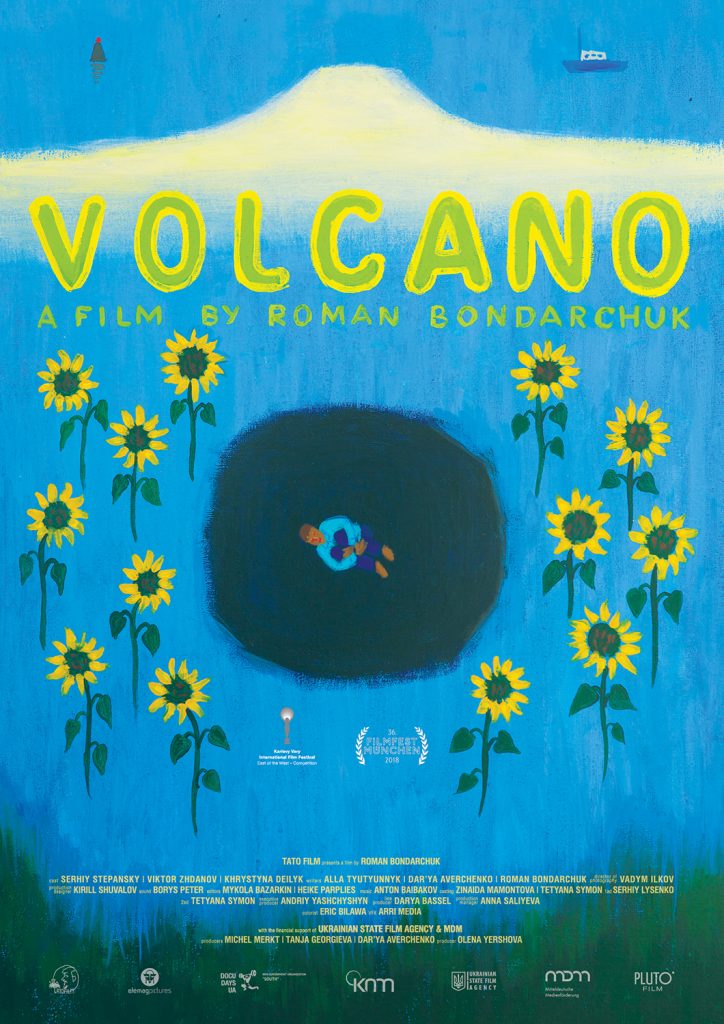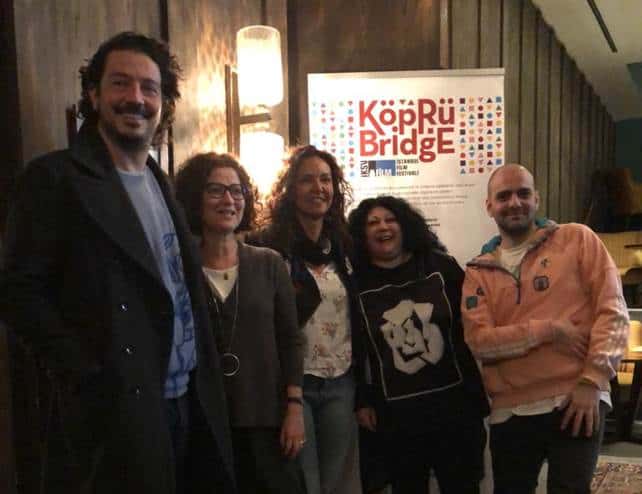An angry girl; System Crasher
Featured in the Young Masters section, System Crasher, which received the Alfred Bauer Award at Berlinale, is Nora Fingscheidt’s first feature-length. Following the screening of the film, which follows the story of 9 year-old Benni who is prone to fits of anger due to traumas she endured, director Nora Fingscheidt, actor Albrecht Schuch, and cinematographer Roy Imer answered audience questions.

Fingscheidt said that she always wanted make a film about an angry girl which bears the traces of her own childhood and shot her film after two years of research on the subject matter. She added that the young and talented actress Helena Zengel, who plays Benni, was selected from a field of 150 candidates: “There was no one else who matched her talent. She is a very special girl. We started working with her 6 months before the shoot and developed the character of Benni together. She was also the part of the casting of adult actors. She was picking out the actors saying “this is the educator I like and this is the one I hate.” She was already inhabiting Benni’s world. It’s fun to work with child actors, because since they can’t work for long hours the shooting stretches to more days. In Germany you can only work with a child actor for 5 hours a day. Including the breaks we had during the production, it took us 5 months to complete the film with 67 days of actual shooting.
For further information about the film click here.
Interview ∣ Teona Strugar Mitevska: No More Flowers, only equality!
11 years ago Teona Strugar Mitevska was amongst festival guests with her sophomore feature-length I Am Titov Veles and this year she is back with her latest which received the Ecumenical Jury Prize at the Berlinale. 32 year-old Petrunia lives with her family in a small town called Stip. As a history major she has trouble finding a job in Stip. Contrary to traditions a woman retrieves the wooden cross tossed in the water during Epiphany: Her Name is Petrunia.
To read Ezgi Ay’s interview click here.
A story of immigration and identity: Synonyms
The Golden Bear-winning Synonyms, the latest film by Nadav Lapid, the director of the original The Kindergarten Teacher, was screened at Atlas Movie Theatre. Following the screening of the film which focuses on a man who immigrates to Paris and tries to deny his roots, Israeli director Lapid answered audience questions.
Nadav Lapid said that he travels back and forth between Israel and Paris and wasn’t really trying to give a message with his film. “I tried to reflect life and existence. The themes were about different issues. I mainly tried to tread along the line of ‘we are prisoners of our identities. What does a country expect from its citizens? Do citizens have to love their countries? If so, how much or does it have a limit?’ were the other questions that factored in the film.”
For further information about the film click here.
Documentary on Leyla Gencer, the diva of Turkish Opera: “Leyla Gencer: La Diva Turca”
The memory of Leyla Gencer, one of the most significant opera artists of the 20th century, is kept alive. Following the exhibition and the voice competition held within the body of İKSV to commemorate the 10th anniversary of her death, the documentary Leyla Gencer: La Diva Turca, produced by IKSV, was screened at the Pera Museum Auditorium. The documentary was directed by Selçuk Metin and written by Zeynep Oral.
During the talk following the screening of the film, director Selçuk Metin said that he never met Leyla Gencer personally, but the conducted years of research on her. Selçuk Metin emphasized Leyla Gencer’s mainstream success and said, “This film is the token of what a woman of the Turkish Republic can achieve.”
Unable to attend the screening, Zeynep Oral sent a message stating the difficulty of duly representing a pioneering diva who “set the stages around the world on fire” including her emotional side.
For further information about the film click here.

An existential black comedy from the Ukrainian borderlands
Volcano, the feature-length debut of Ukrainian documentarian Roman Bondarchuk, is a black comedy. Olena Yershova, the producer of the film, which depicts the bizarre world of a village that Lukas, an OSCE interpreter, takes shelter in, answered audience questions after the screening.
How did you develop the script?
The director and writer of the film were born in Kherson on Ukraine-Crimea border. We wanted to tell about the specific ways of life in this area where there is no president, no law, no police. The main character Uncle Vova is a real person and the uncle of our screenwriter. The script was inspired by real life events.
Will the film open in Russia? Is there nostalgia for Lenin in Ukraine?
No, it won’t open in Russia. Even though we have received very positive reviews from Russian critics, we really don’t know how it will be received in general. We don’t want to risk it. They might think that we’re saying that Ukraine is in bad shape, but we were mostly concerned about existential problems. The film is more about internal problems and existential issues people face than any given political event.
And about Lenin, it’s still complicated. Ukraine is still not used to being independent. As you can see the economy is still on shaky ground. We can’t expect it to be smooth, it’s going to take a while but the new generation doesn’t know who Lenin is. Give it a little more time and we won’t even remember that we were under the Lenin regime for 100 years.
Why is it called ‘Volcano’?
The film takes place on a steppe, there’s no volcano. We were going for an existential meaning. It refers to people’s state of mind. They are full of emotions ready to explode. If you constantly think like that the only thing you can do is laugh.
For further information about the film click here.
Ermanno Olmi through the eyes of Jak Şalom
Jak Şalom, one of the founding members of the Turkish Cinemateque Association and the recipient of this year’s Outstanding Contribution to Cinema Award, introduced Ermanno Olmi’s Il Posto (1961) before it’s screening at the Kadıköy Film Theatre. Il Posto, which was Olmi’s second feature film, is considered one of the masterpieces of Italian cinema.
Jak Şalom states that Ermanno Olmi is not considered as one of the most important directors of Italian cinema and he is not as well-known as Visconti, Fellini, or Bertolucci. “His father puts him to work in an electrical company. He starts making films with his 16mm camera while working as an errand boy. His efforts are noticed by the company executives and they give him the opportunity to make a documentary. That’s when he learns about filmmaking. He becomes proficient in every aspect of filmmaking during this time. The Tree of Wooden Clogs won a Palm D’or. He wrote, directed, shot, and edited the film. So he made that film as a complete auteur.”
Şalom says that Olmi’s films were unusual for the cinema of that time and also Italy and adds: “He has a humanist relationship with film and thus he was criticized for not taking sides or having a political stand. With gentle strokes of his brush, Olmi managed to very sensitively portray what was going on in Italy in 1961.”
For further information about the film click here.
Tolga Karaçelik talked about Butterflies at Meetings on the Bridge
Tolga Karaçelik was a guest on the first day of Meetings on the Bridge. Karaçelik, who won the Best Film Award at the Sundance Film Festival with Butterflies, talked about the production story of the film.

“I approach the scriptwriting process like an engineer. I take extensive notes. Walls get plastered with post-its. I note how long each scene will last. I watch the film through the notes and say “ok, now we’re at the 40-minute mark.” I give points to scenes, 2.5 out of 5 or 4 out of 5. No scene should be lower than 4 out of 5. The audience should not be watching a hollow film”
For further information about Meetings on the Bridge Cinema Talks click here.
Daily Film Selection:
We the Coyotes | 19.00 | Cinemaximum Zorlu Center
Yuli | 19.00 | Rexx movie theatre
Daily Documentary Selection:
Saz – The Key of Trust | 16.00 | Cinemaximum Zorlu Center
Meeting Gorbachev | 19.00 | Pera Museum Auditorium
Festival in Photos
See daily photos from the festival at http://www.iksvphoto.com/#/folder/aa602o and on our Instagram account.
Images courtesy of IKSV.









